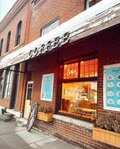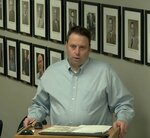PRESCOTT – The Prescott Plan Commission heard from City Planner Carter Hayes Aug. 7 as he addressed the Commission about the proposed paid parking plan for downtown Prescott.
“We …
This item is available in full to subscribers.
To continue reading, you will need to either log in, using the login form, below, or purchase a new subscription.
If you are a current print subscriber, you can set up a free website account and connect your subscription to it by clicking here.
Otherwise, click here to view your options for subscribing.
Please log in to continue |


PRESCOTT – The Prescott Plan Commission heard from City Planner Carter Hayes Aug. 7 as he addressed the Commission about the proposed paid parking plan for downtown Prescott.
“We were looking for alternative sources of revenue and that revenue can be returned for added public services,” Hayes said, giving examples of public Wi-Fi, street plantings, park amenities, or parking infrastructure. He added that paid parking stimulates turnover and can open spots for new patrons in the downtown. He said that opening up new spots cuts down on cruising and traffic congestion and explained that downtown paid parking will also manage the current parking inventory more effectively.
The city of Prescott intends to use IPS Group’s multi-space pay stations for traditional payments and the mobile app Park Mobile for app-based payments at the proposed rate of $1.50 per hour with no specified maximum time limit except that vehicles cannot be parked overnight in non-designated areas. Residents and employees can register through an online portal with resident permits at no cost, although there is a two-vehicle limit per address. Employee permits would cost $8 per month and are only allowed in parking areas northeast of Broad Street that currently holds 171 spaces. Permits are being discussed for the boat launch and extended stay passes for people at the marinas who park for long periods of time.
Under this proposal, the Annual Resident Permit would have no cost and be valid all day and in all areas with no overnights. The Monthly Business Permit would cost $8 per month per employee and would be valid in all areas northeast of Broad Street. The Annual Visitor Permit was added after community discussions and would cost $120 for the year and would be valid all day and in all areas. The 24-Hour Permit would be $12 per day for 24 hours in the designated areas of Orange Street Lot, Cherry Street Lot and Mercord Mill Parking Lot.
For enforcement of the parking proposal, Prescott Police would have two vehicles outfitted with license plate readers along with software for scanning license plates in the parking database. The $60 citation is immediately sent to the municipal court software through IPS and TIPPS integration.
Plan Commission member Kate Otto asked Hayes why the cost for the annual resident permit decreased and wondered if it was cost effective. Hayes agreed that it was cost effective and explained that residents are already paying taxes and that money already goes towards parking space upkeep and the city didn’t want to burden the residents with a permit cost.
City Administrator Matt Wolf shared the ways the city would be able to use the revenue from the permits or hourly paid parking. Under the proposal, 50% of the revenue would go to the Downtown Parking Fund where it could be used for items such as additional parking acquisition and construction, overall beautification items for downtown or for events like Prescott Daze and music concerts. The other 50% would go to the Capital Improvement Fund for items such as parks projects, public works vehicles and equipment, or streets projects.
“This would be with the assumption that the initial money is all going to be going back to the paid parking implementation,” Wolf said. “So, there will be a set amount of money that we’ll have to spend to begin the process and once that money’s paid back that’s when these funds will be utilized.”
As the commission considered that funding can possibly pay for more parking, Hayes said the parking experts they have talked to say that “we do have enough parking, it’s just not being managed effectively. You don’t have enough turnover; you have people parking and staying there all day. It just doesn’t have enough turnover, but we do have enough parking in our downtown.”
Wolf said the city received feedback from neighboring townships expressing the desire to be able to purchase permits as well, but he explained that while they value the relationships with neighbors in the surrounding townships, the residents of the city of Prescott are responsible for maintaining all the parking and they pay for the police, parks, library and public works departments so the proposal would not allow permits for the townships.
Commission member John Peterson asked, “What was the reasoning behind the two-vehicle maximum?”
Wolf said the city is trying to cut down on how many permits would need to be reviewed and checked.
“I think that’s hard. That’s going to be a tough one,” Otto said.
Her own household will soon have more than two vehicles as another driver will be added.
The Plan Commission recommended that the council add additional vehicles per address for the residential permits.
Commissioner Dave Hovel asked Wolf, “Is this the solution when the Planning Committee asked to help solve the parking problem downtown or is this totally different than what we recommended or asked for?”
“This is totally different,” Wolf answered, adding that this came about because of a conversation in October 2022.
Business owner feedback
Matt Bronk, along with his wife Allison, a former teacher, have owned The Twisted Oak Coffee House in downtown Prescott for the past eight years and are expecting their first child. After learning of the Downtown Paid Parking Proposal, he feels downtown Prescott business owners are being taken advantage of.
Bronk explained that when he opened his business eight years ago, parking wasn’t a problem. When Covid hit and Minnesota residents began to visit Prescott, parking became a bigger issue. He believes that every year it has become a little better and that the parking problem has been alleviated considerably.
“If parking was the problem, we would be the ones screaming, ‘Hey, help us!’ We’re here screaming, ‘Please, dear God, don’t let this go through instead,’” he said, referring to the Parking Proposal.
Bronk said the city has put in a parking lot to help with parking, but that people don’t park there because of lack of city signage.
When asked how he would like to see the city respond, he stated, “We would love to see some of these downtown parking lots have better signage. I’d love to see them actually enforce the current laws that they have now because all of downtown is two-hour parking. If you haven’t really tried using the system you have in place, why are you looking for another solution to the problem?
“Our downtown is a business for the city and right now they need to still be investing the money back into it rather than trying to take all of the profits out of it. Our downtown is too fragile and too newly successful to be scraping all the profits out of it.”
He doesn’t feel this is a good thing for downtown businesses and adds that most downtown business owners are against it.
“I think that it won’t hurt a couple of the bigger sit-down restaurants at first,” Bronk said. “But the thing that they don’t remember is that if we start to lose some of these smaller spots that really need parking for in and out traffic and those places start to disappear and we get vacant open spaces again like we had eight years ago, our entire downtown, including the sit-down restaurants, will all struggle, and they will feel that hurt.”
He adds that tourists will not want to visit a dying downtown.
Bronk also had remarks about the parking time limits ending under the new proposal.
“The city at one point had a time limit on how long you could park in those spaces and now they are not requiring a time limit,” he said. “It's not fixing anything. It’s just charging for it. They said this will create turnover but now there’s no time limit. So, all these things they originally said they have gone back on. It feels like it’s become all about the revenue. It’s too early to be trying to pull profits out of our downtown with how young our downtown is. We still need to grow and find some stability because right now we’re still transitioning out of Covid. We’re still coming back.”
Bronk said the city’s studies are showing that there is enough parking in downtown Prescott.
“What this has turned into is strictly about revenue. They (the Council) are along the lines of admitting that now. It’s not to fix the parking problem because our studies show there is no parking problem. We have enough parking. So, if that’s what it’s about then they should have been upfront about that from the beginning. And if it’s about revenue then they need to remember what taking some of these small businesses out of downtown Prescott will do,” he said.
Bronk expressed his frustration concerning a comment made by Hayes regarding business owners paying for the permits for their employees.
“He stated that the moral thing would be for the businesses to pay for the employees,” Bronk said. “It’s a little offensive because it’s kind of stating that us businesses are rich. I brought in $33,000 personally last year. I’m paying out $10,000 a month in wages. If I have to pay this for all my employees, that’s about an extra $2,000 a year. That’s straight out of my pocket. Us downtown businesses, even if we look successful, we are scraping by and we are just trying to keep our heads above water. And to make it more difficult on us is really frustrating.”
Bronk shares the difficulty of small businesses making ends meet during the winter season.
“They keep calling all of the congestion a problem, but having a bustling downtown isn’t a bad thing. It’s a good thing!” Bronk said. “We don’t want to be punishing drivers for trying to stop into our businesses and spend money and support us. Tourism in the summer keeps us afloat and local traffic in the winter keeps us sane. We need that tourism to really get over the hump of actually being able to pay our bills.” He believes summer tourism will be considerably affected if the downtown paid parking proposal is passed. He feels this solution would impact businesses year-round but, in the months when tourism slows down, there are no parking issues. Bronk also mentioned that under this new proposal, motorcycles will each need their own individual parking spot that will create a bigger problem in regard to lack of parking. Bronk plans to attend the upcoming business informational meeting.
“I think the City Council wants what’s best. I really believe they want what’s best. This proposal would just be a bad investment for Prescott,” he said.
The Downtown Business Informational Meetings are scheduled for 11 a.m. and 3:30 p.m. Tuesday, Aug. 22. The city council public hearing will be held Monday, Aug. 28. If all goes to plan, the Paid Parking Infrastructure could be installed and implemented as early as October through December.